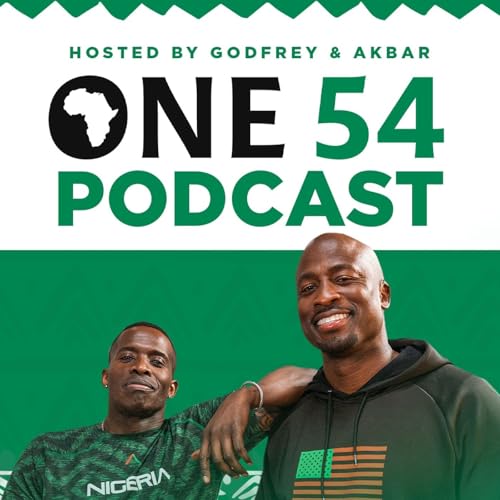
Nigerians vs Americans, Colonization, Colorism & Comedy | One 54 Full Episode
カートのアイテムが多すぎます
ご購入は五十タイトルがカートに入っている場合のみです。
カートに追加できませんでした。
しばらく経ってから再度お試しください。
ウィッシュリストに追加できませんでした。
しばらく経ってから再度お試しください。
ほしい物リストの削除に失敗しました。
しばらく経ってから再度お試しください。
ポッドキャストのフォローに失敗しました
ポッドキャストのフォロー解除に失敗しました
-
ナレーター:
-
著者:
このコンテンツについて
Akbar reflects on life as a Nigerian kid growing up in Los Angeles, sharing stories about wanting used jeans his father couldn’t understand, wearing traditional African clothes in his school photos, and learning the importance of conserving water after visiting Nigeria. He remembers his father’s James Earl Jones-like voice, his work as a plumber, and his refusal to accept welfare despite hardships. Akbar also opens up about his NFL years with the San Diego Chargers, playing alongside stars like LaDainian Tomlinson, Antonio Gates, and Philip Rivers, but never making the playoffs.
The conversation stretches across culture and history. Godfrey and Akbar compare growing up in Chicago versus Los Angeles and explain how Eddie Murphy’s "Coming to America" made it easier to embrace being African in the U.S. They discuss the differences between light-skin and dark-skin experiences, from Michael Jordan and Wesley Snipes redefining attractiveness for dark-skinned men, to the lack of recognition given to dark-skinned women. They talk about Sammy Sosa bleaching his skin and the fear that Michael Jackson may only be remembered for being light-skinned.
Godfrey dives deep into African history, breaking down how pyramids in Egypt were constructed, comparing the “aliens built the pyramids” myth to Irish building Stonehenge, and arguing that Africans, not outsiders, were the real innovators. He explains how humanity traces its genetic roots back to Africa, jokes that Nelson Mandela looked like a “Chinese Black man,” and connects the origins of instruments like the banjo to Africa. He critiques how white people stole resources from Nigeria and the rest of Africa, connects Elon Musk’s wealth to stolen African resources, and breaks down how propaganda depicts Black people through harmful stereotypes in everything from HIV ads to images of poverty. He also shares how Africans influenced Japanese culture and history, connects surfing back to its African roots before white people rebranded it, and even explains why the oldest living person and the most diverse area in the world — Queens, home of Donald Trump — both trace back to Africa.
The episode is packed with comedy too: Godfrey imitates his Nigerian dad as a teacher in Chicago, recalls his father catching him after he pierced his ears, and does impressions of Donald Trump that leave Akbar laughing. They talk about Nigerians pointing with their lips and eyes instead of hands, Nigerian parents refusing to say “I love you,” and the bizarre rules about bath time and wash cloths. Godfrey remembers being roommates with Viola Davis in New York before she was dubbed the “Black Meryl Streep,” and explains how actors don’t talk about money the way NFL players do.
From cultural clashes to personal triumphs, from Oprah to Michael Jordan, from African pyramids to Shannon Sharpe’s Club Shay Shay, this episode captures the full spectrum of what it means to be African in America today.
まだレビューはありません


